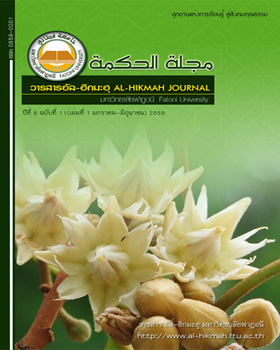The methodology of the Prophet in Rationalization Religious Discourse
Keywords:
The methodology of the Prophet, Rationalization, Religious discourseAbstract
Find addresses that carry the values of rationalization and Maieraltqoam derived from knowledge of Revelation ; on a platform of prophecy in the warning and advice; And thus contribute to research to improve the correction and rationalization and calendar; through the consolidation of the Justice and diffusion, dissemination and achieve in life and in the world of people.
The importance of research in that reporting (best nation) the values of the right people and witness them, and entice them to do good; requires the nation undertaking the Alatsaf Secretariat to carry out their responsibility; educational climate in which the conscious mind is formed and provide adult . The research methodology in the study of historical analytical objectivity Library.
The research aims to the following:
(1) A statement that the concept of victory from the esteemed prophets, is consistency on the approach and call no matter how long.
(2) Clarify that Allah's U law does not lag behind and appreciation of an arbitrator in the physical perceived victory.
(3) Study the rationale for the wrath of the Prophet r.
(4) Briefing that the approach of prophecy is the Islamic call for leniency and forbearance and deliberation, and wisdom and good advice. The study concludes the following results:
Allah's law legitimacy, and follow the approach r Messenger of Allah in the life of the Muslim Nation.
(1) The need to invoke the law of Allah U legitimacy, and follow the approach r Messenger of God in the life of the Muslim Ummah.
(2) The importance of the adoption of intent in cash and dialogue as a means to demonstrate the flaw, and the exercise of the dispute in the best manner.
(3) The need to own a calendar and rationalization tools, and practice of following the example of Prophet's biography.
(4) The importance of recognizing the other thanks, and clarified that the purpose of rationalization is the pursuit of truth.
References
الحديث الشريف. (التخريج بواسطة برنامج المكتبة الشاملة للنشر الحاسوبي الموافق للمطبوع).
ابن هشام، السِّيرة النبويَّة، دار المعرفة: بيروت – لبنان.
البنا، فؤاد (1431). التفكير الموضوعي في الإسلام. كتاب الأمّة، العدد (137)، إصدار وزارة الأوقاف والشؤون الإسلاميّة بدولة قطر.
البوطي، محمد سعيد رمضان (1419)، فقه السِّيرة النبويَّة، دار السلام : القاهرة.
المباركفوري، صفي الرّحمن (1418)، الرحيق المختوم، ط1، دار السلام للنَّشر والتَّوزيع.
الروابط الالكترونية على الشبكة العنكبوتية:
http://www.almoslim.net/node/212253.



